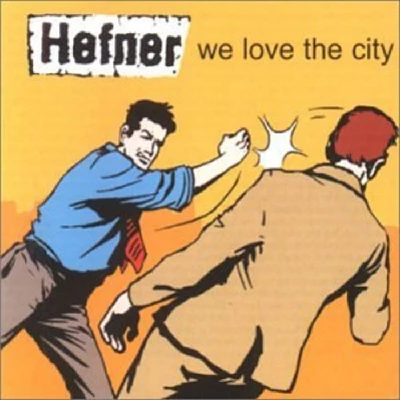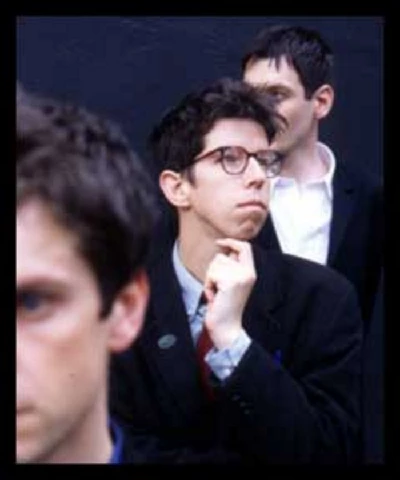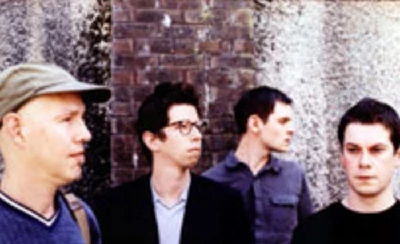Hefner
-
We Love the City
published: 24 /
9 /
2009

In our 'Re:View' series, in which our writers rrflect on albums from the past, Ben Howarth looks at Hefner's 'We Love the City', which originally released in 2000, has just been reissued in a new double CD edition
Article
Now, here’s a sign that this website (not to mention this writer) is starting to get old. For the first time, I’m writing a review of an album that I actually reviewed upon its initial release.
Hefner released 'We Love the City' in the latter half of 2000, having ended the previous century placed at 2 and 3 in the Festive 50, a run down of John Peel listeners’ favourite tracks of the year. Having enjoyed genuine commercial success (take this with a pinch of salt, of course - they were known as ‘Britain’s biggest small band’ for a reason) and having been reunited with the woman who inspired most of the songs on his last album, Hefner’s songwriter Darren Hayman set about taking his band away from embittered indie towards the more ambitious, conceptual style he has favoured ever since.
Hayman believes this to be Hefner’s finest album - but I rather suspect there are still large parts of his fanbase who don’t agree. I know this, because until this reissue, I was one of them. I enjoyed ‘We Love the City’, and felt it to have probably the band’s finest song in its lead single, ‘Good Fruit’. But I never felt quite so close to this album as I had to its predecessors.
This now simply seems like a case of bad timing. Reviews at the time compared the album to 'Parklife'-era Blur, and didn’t mean this as a compliment. Nine years later, Blur have reformed to widespread acclaim, while this album - which seemed a bit overdone in 2000 - now sounds modestly unassuming. My impression may have also changed as a result of Hayman’s subsequent work - in retrospect, this album seems a far better reflection of the kind of person he is than his earlier offerings.
Ultimately, even a brief reappraisal of this album shows that my judgement failed me when I wrote my first review (even if it was broadly positive). For example, I dismissed ‘Don’t Go’, as “truly terrible”. Having done so, I then skipped the song every time it came on. Later, I was much surprised when I interviewed Darren, and he nominated it as possibly his favourite song by the band.
‘Don’t Go’ entirely belies any suggestion that Hefner were trying to abandon the indie scene for an embellished chart friendly sound. It sounds like the kind of slightly-silly tunes Paul McCartney conjured up for his underrated solo albums, effortlessly tuneful and entirely of itself. Hayman says of this song that it "delivers an uncomplicated sentiment in an unusual way", and he’s spot on. After a brief, commercially unsuccessful dalliance with synthesisers, the country-skiffle approach of this song became the template for much of Hayman’s solo work.
‘We Love the City’ is set out as a concept album about London, but it isn’t really so much about London itself as it is about some of the people that live there, unable to quite imagine living anywhere else.
Its lyrical themes are an extension to the kind of songs he had written before - but a tad more grown up, and generally stripped of the slightly nauseating embarrassment that characterised his heart-on-sleeve early work. Musically, likewise, the band simply improve on ideas already put forward on this album’s predecessor, ‘The Fidelity Wars’. Jack Hayter joined the band officially for this album, but his pedal steel and guitar had been found on earlier work, and the soul influences so evident here had already creeped onto ‘We Were Meant to Be’ a year earlier.
The attention to detail here is what makes for a much richer listening experience than anything that comes before; a tiny squeal of feedback just as the chorus kicks in on the title track, the tin-pot drums that give ‘Don’t Go’ its carefree air, the piano line that chimes in alongside the guitars during the mid-section of ‘As Soon As You’re Ready’, the way that the sing-along section of ‘The Greedy Ugly People’ is segued into a scratchy demo version to prevent it sounding schmaltzy - it’s the only Hefner album where you feel that as much of the credit should go to his band than to Hayman.
Anyone undecided if they should buy this album should simply take a listen to ’Good Fruit’, a sweeping ballad, which sounds magnificent despite being based on the simplest of musical accompaniments. A ’getting back together’ song that seems like a celebration, it actually focuses on the self-doubt of someone who’s not sure if he has done enough to win his love back round. A simple concept, Hayman has a knack of coming at subjects like these from just far enough left of the field.
This reissue package comes with a whole load of bonus material - including some B-sides and some songs that had made their way onto the 'Boxing Hefner' compilation (which isn’t getting its own reissue) earlier in 2000 - look out for ‘The Hymn for the Coffee’, but be warned that the version of ‘The Hymn for the Things We Didn’t Do’ isn’t quite as effective as an earlier recording now available on 'The Fidelity Wars' reissue. There are also some demos, of varying quality, which show just when the band had some of their best ideas.
Track Listing:-
Band Links:-
http://hefnet.com/
https://www.facebook.com/profile.php?i
https://twitter.com/darrenhayman
Have a Listen:-
Picture Gallery:-

